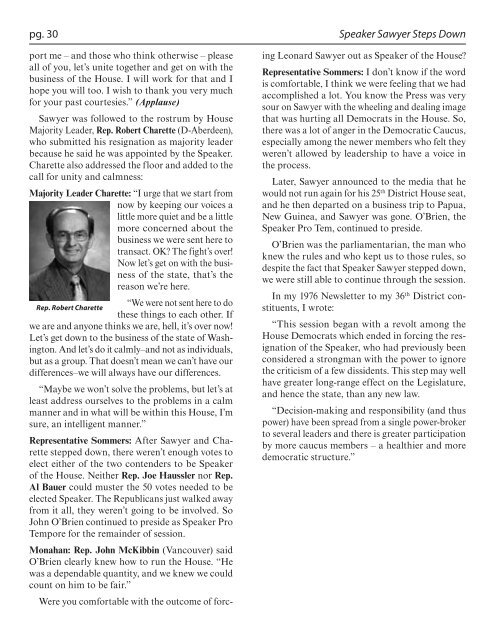Helen Sommers: An Oral History
Helen Sommers: An Oral History
Helen Sommers: An Oral History
You also want an ePaper? Increase the reach of your titles
YUMPU automatically turns print PDFs into web optimized ePapers that Google loves.
pg. 30 Speaker Sawyer Steps Down<br />
port me – and those who think otherwise – please<br />
all of you, let’s unite together and get on with the<br />
business of the House. I will work for that and I<br />
hope you will too. I wish to thank you very much<br />
for your past courtesies.” (Applause)<br />
Sawyer was followed to the rostrum by House<br />
Majority Leader, Rep . Robert Charette (D-Aberdeen),<br />
who submitted his resignation as majority leader<br />
because he said he was appointed by the Speaker.<br />
Charette also addressed the floor and added to the<br />
call for unity and calmness:<br />
Majority Leader Charette: “I urge that we start from<br />
now by keeping our voices a<br />
little more quiet and be a little<br />
more concerned about the<br />
business we were sent here to<br />
transact. OK? The fight’s over!<br />
Now let’s get on with the business<br />
of the state, that’s the<br />
reason we’re here.<br />
“We were not sent here to do<br />
Rep. Robert Charette<br />
these things to each other. If<br />
we are and anyone thinks we are, hell, it’s over now!<br />
Let’s get down to the business of the state of Washington.<br />
<strong>An</strong>d let’s do it calmly–and not as individuals,<br />
but as a group. That doesn’t mean we can’t have our<br />
differences–we will always have our differences.<br />
“Maybe we won’t solve the problems, but let’s at<br />
least address ourselves to the problems in a calm<br />
manner and in what will be within this House, I’m<br />
sure, an intelligent manner.”<br />
Representative <strong>Sommers</strong>: After Sawyer and Charette<br />
stepped down, there weren’t enough votes to<br />
elect either of the two contenders to be Speaker<br />
of the House. Neither Rep . Joe Haussler nor Rep .<br />
Al Bauer could muster the 50 votes needed to be<br />
elected Speaker. The Republicans just walked away<br />
from it all, they weren’t going to be involved. So<br />
John O’Brien continued to preside as Speaker Pro<br />
Tempore for the remainder of session.<br />
Monahan: Rep . John McKibbin (Vancouver) said<br />
O’Brien clearly knew how to run the House. “He<br />
was a dependable quantity, and we knew we could<br />
count on him to be fair.”<br />
Were you comfortable with the outcome of forc-<br />
ing Leonard Sawyer out as Speaker of the House?<br />
Representative <strong>Sommers</strong>: I don’t know if the word<br />
is comfortable, I think we were feeling that we had<br />
accomplished a lot. You know the Press was very<br />
sour on Sawyer with the wheeling and dealing image<br />
that was hurting all Democrats in the House. So,<br />
there was a lot of anger in the Democratic Caucus,<br />
especially among the newer members who felt they<br />
weren’t allowed by leadership to have a voice in<br />
the process.<br />
Later, Sawyer announced to the media that he<br />
would not run again for his 25 th District House seat,<br />
and he then departed on a business trip to Papua,<br />
New Guinea, and Sawyer was gone. O’Brien, the<br />
Speaker Pro Tem, continued to preside.<br />
O’Brien was the parliamentarian, the man who<br />
knew the rules and who kept us to those rules, so<br />
despite the fact that Speaker Sawyer stepped down,<br />
we were still able to continue through the session.<br />
In my 1976 Newsletter to my 36 th District constituents,<br />
I wrote:<br />
“This session began with a revolt among the<br />
House Democrats which ended in forcing the resignation<br />
of the Speaker, who had previously been<br />
considered a strongman with the power to ignore<br />
the criticism of a few dissidents. This step may well<br />
have greater long-range effect on the Legislature,<br />
and hence the state, than any new law.<br />
“Decision-making and responsibility (and thus<br />
power) have been spread from a single power-broker<br />
to several leaders and there is greater participation<br />
by more caucus members – a healthier and more<br />
democratic structure.”
















